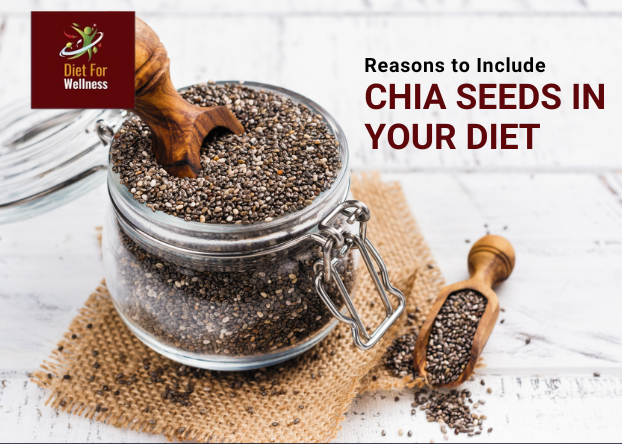Reasons to Including Chia Seeds in Your Diet

Chia seeds are nutrient-dense and have been valued for their health benefits since ancient Aztec and Maya times. Belonging to the mint family, Salvia Hispanica, native to Central America, produces the small black or white seeds known as chia seeds. They may support heart health, bones, and blood sugar management. They’re also versatile in cooking.
Tiny Powerhouses of Nutrition
Don’t let their size fool you; chia seeds are nutritional heavyweights, boasting fiber, protein, omega-3s, antioxidants, and vital minerals like calcium, magnesium, and phosphorus.
1. Omega-3 Fatty Acids– Brain and Heart Boosters
Chia seeds are an outstanding source of omega-3s, particularly alpha-linolenic acid (ALA), an essential fatty acid your body can’t produce. Omega-3s, important for brain function, heart health, and inflammation reduction, promote overall well-being. ALA specifically has been linked to a lower risk of heart disease.
2. Fiber– Digestive and Heart Health Hero
Just 2 spoons of chia seeds deliver nearly 10 grams of fiber, significantly contributing to your daily intake. Fiber is associated with a reduced risk of coronary heart disease, type 2 diabetes, various cancers, inflammation, and digestive issues. It also helps manage cholesterol and triglyceride levels, promoting heart health, and aids digestion by softening stool and preventing constipation.
3. Antioxidants– Cellular Defenders
Chia seeds are packed with antioxidants like tocopherols, phytosterols, carotenoids, and polyphenols. These compounds combat free radicals, protecting cells from damage and potentially reducing the risk of inflammation, diabetes, cancer, heart disease, and Alzheimer’s disease.
4. Protein– Sustained Energy and Blood Sugar Balance
Chia seeds are a rich source of protein, containing all nine essential amino acids. This protein helps stabilize blood sugar levels and provides a sustained energy release.
Science-Backed Health Benefits of Chia Seeds
Historically, the Aztecs and Maya valued them for dietary, medicinal, ritualistic, and cosmetic uses. Today, their popularity spans the globe, and modern science confirms their impressive nutritional profile. 2 tablespoons deliver
- 138 calories
- 7g protein
- 7g fat (including 5g ALA omega-3s)
- 9g carbs (9.8g of which is fiber)
- Significant amounts of calcium, iron, magnesium, phosphorus, zinc, and B vitamins.
- Nutrient-Rich Powerhouse
Despite their size, chia seeds are packed with fiber, protein, omega-3 fatty acids, and essential micronutrients.
- Antioxidant Abundance
Chia seeds are rich in antioxidants like chlorogenic acid, caffeic acid, myricetin, quercetin, and kaempferol. These protect the seeds’ fats and neutralize harmful free radicals in the body, potentially reducing the risk of aging and chronic diseases.
- Potential Weight Management Aid
Their high fiber and protein content may support weight loss efforts. While research is mixed, fiber can contribute to satiety, and protein may reduce appetite. However, chia seeds alone won’t cause weight loss; they’re best used as part of a balanced diet.
- Heart Health Support
Chia seeds’ soluble fiber and omega-3s may lower heart disease risk by reducing cholesterol and blood pressure. More research is required, but initial studies are promising.
- Bone-Strengthening Nutrients
They provide crucial bone nutrients- calcium, phosphorus, magnesium, and ALA. Animal studies suggest potential benefits for bone mineral density, but human research is limited.
- Blood Sugar Regulation
Chia seeds may help manage blood sugar levels, possibly due to their fiber and other compounds. Early human studies show potential for lowering post-meal blood sugar spikes, but more research is needed.
- Culinary Versatility
Chia seeds are incredibly easy to incorporate into any diet. The mild flavor of chia seeds allows them to easily blend into various dishes. They can be eaten raw, soaked, or added to oatmeal, smoothies, baked goods, and more. Their ability to absorb liquid makes them useful as a thickening agent and egg substitute. Start with small portions to avoid digestive discomfort due to their high fiber content.
While generally safe, chia seeds can cause digestive issues if not consumed with enough water. Pre-soaking may help, but always prioritize adequate hydration.
Ways of Adding This to Your Diet
Adding chia seeds to your diet is effortless. Due to their mild flavor they have become a versatile ingredient.
Simply sprinkle a tablespoon or two onto yogurt, cereal, salads, or blend them into smoothies and soups. You can also incorporate them into pancake batter or other breakfast favorites. For a unique treat, try chia pudding- when mixed with liquid, chia seeds create a delightful, gelatinous pudding.
Summing Up
Easy to prepare and packed with nutrients like fiber, omega-3s, and antioxidants, chia seeds are a valuable dietary addition. Though studies hint at benefits like weight loss and heart health support, more human research is required. Enjoy them in smoothies, yogurt, or baked goods for a simple health boost.
